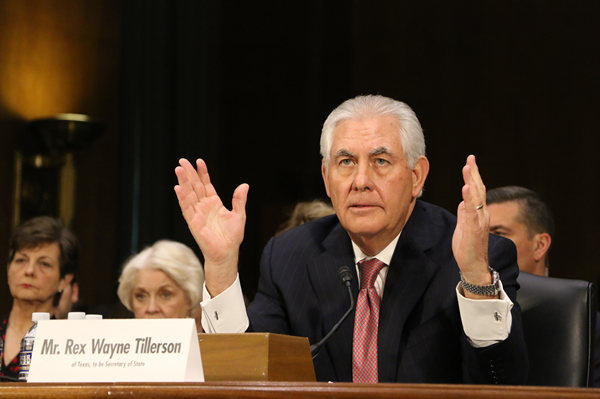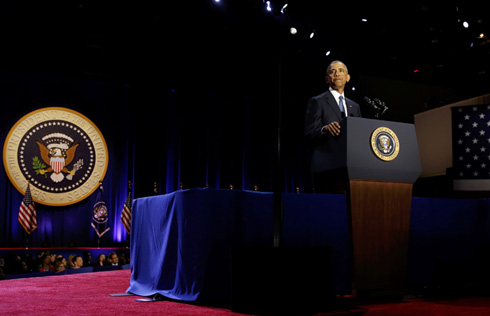Tillerson: US-China friendly, adversarial
|
 |
|
Rex Tillerson speaks during the IHS CERAWeek 2015 energy conference in Houston, Texas April 21, 2015. [Photo/Agencies] |
Rex Tillerson, US President-elect Donald Trump's nominee for secretary of state, described interactions between the United States and China as "both friendly and adversarial."
In his confirmation hearing on Wednesday before the Senate Foreign Relations Committee, Tillerson was grilled most of the time for his close Russian ties, including with President Vladimir Putin when he was CEO of Exxon Mobile. China came up several times in the day-long hearing.
"China has emerged as an economic power in global trade, and our interactions have been both friendly and adversarial," Tillerson said in his testimony.
Tillerson criticized China's land reclamation in the South China Sea and said China has not fulfilled its promise on UN sanctions on the Democratic People's Republic of Korea. "We cannot continue to accept empty promises like the ones China has made to pressure North Korea to reform, only to shy away from enforcement," said the 64-year-old.
Tillerson said China's economic and trade practices have not always followed its commitments to global agreements. He also accused China of stealing US intellectual property.
In his first press conference after winning the election on Nov 8, Trump on Wednesday also accused China of hacking into the US Office of Personnel Management and taking advantage of the US economically and in the South China Sea.
"We have to deal with what we see, not with what we hope," Tillerson said.
But Tillerson emphasized "we need to see the positive dimensions in our relationship with China as well".
"The economic well-being of our two nations is deeply intertwined. China has been a valuable ally in curtailing elements of radical Islam. We should not let disagreements over other issues exclude areas for productive partnership," he said.
Asked about the Trump administration's policy on Taiwan, Tillerson reiterated the US commitment to Taiwan, but said, "I don't know that there is any plan to alter the one China position".
He mentioned several times his "whole of China approach", saying "we've got to deal with the whole of China actions and recognize we have these balancing forces in our relationship that need to be dealt with."
Jonathan Pollack, a senior fellow at the John L. Thornton China Center of Brookings Institution, said Tillerson's testimony was not a definitive indicator of future US foreign policy toward China.
"But his opening statement and some of his replies to Senatorial questions reveal a decidedly hard edge to his views of China," he said.
"Though he acknowledges more positive developments in economic cooperation and in opposing international terrorism, his testimony makes no mention of US-China cooperation on the Iranian nuclear agreement or in the Paris climate accords. Such strongly worded complaints directed against China suggest that US-China relations could be entering a much more contentious phase as the Trump administration assumes power," he said.
Zhiqun Zhu, professor of political science and international relations at Bucknell University in Pennsylvania, said Tillerson's statement was more moderate than he'd expected.
"He does not have a pro-Russia stance and his view of the US-China relationship as both friendly and adversarial is consistent with the mainstream thinking in the US," Zhu said.
Based on Tillerson's testimony, Zhu said there are many opportunities for cooperation between China and the US, but on several issues, particularly North Korea and the South China Sea, the two sides will have some rough times ahead.
"So it is expected that the US-China relationship will continue to be marked by cooperation and contention in the years ahead. I do not think any member of the Trump administration will intentionally disrupt and derail this most important bilateral relationship," he said.
Jon Taylor, professor of political science at the University of St Thomas in Houston, Texas, said Tillerson's statement that the US should not let disagreements over other issues exclude areas for productive partnership was a hopeful comment.
"However, Tillerson's testimony provided a mixed message to China, one that signals that the Trump administration intends to disrupt the status quo of China-US relations," he said.
"Where that will lead us is a pivotal question. But given the comments of the president-elect and some of his appointees, I would not be optimistic."

























